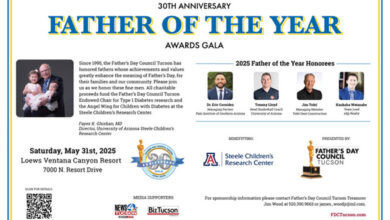
Lute Olson
A Legend in Basketball and Life
By Steve Rivera
At a recent function, Lute Olson’s players were given two minutes each to talk about their former coach.
The University of Arizona players talked about his aura, presence, style and grace. They talked about attention to detail, the importance of team and family.
Ben Davis talked. And talked. And talked. Ten minutes later, he was done – and he could have continued for another 10 minutes. That’s the impact that Coach Olson had on them. Lute – as he was legendarily known – died in August at age 85.
“He was a father figure,” said Davis, a junior-college transfer to UArizona in the early 1990s. “He always had and always gave confidence to all his players. It’s something that we all carry with us to this day.”
Olson transformed a once down-and-out basketball program into a powerhouse, and without question, the best college basketball program in the West for nearly three decades.
Arizona was 4-24 the previous season when Olson walked into a press conference in 1983 as the new head coach. With a regal, towering presence, Olson told fans to buy their tickets now because it would soon be the toughest ticket in town. Five years later, Tucson was the toast of the NCAA tournament, reaching its first NCAA Final Four in 1988.
“We all know what kind of job he did, but how quickly he did it was tremendous,” said Paul Weitman, considered Lute’s best friend for four decades and constant companion on basketball trips. “He came here when they had little success, winning just four games before he arrived. He won at a great rate. Then, it was all over.”
Over – as in other schools couldn’t keep up. Arizona, under Olson, would ultimately reach four Final Fours and win 15 Pac-10 conference and tournament titles.
Olson went 589-187 in 24 years at Arizona, finishing 781-279 in his coaching career. His 73.7 winning percentage ranks 14th overall in NCAA history. Olson was a five-time national Coach of the Year and seven-time Pac-10 Coach of the Year. He was inducted into the Naismith Memorial Basketball Hall of Fame in 2002 and the National Collegiate Basketball Hall of Fame in 2006.
“Besides a good friend, we lost a very good basketball coach,” Weitman said. “I always thought he was one of the best at what he did with talent and how hard he worked. He developed them. He was the best.”
Maybe, even underrated. Former Wildcat and NBA star Richard Jefferson said on ESPN his former coach didn’t get enough credit for developing his players. Thirty-one former players would play in the NBA – 12 were first-round draft picks. Collectively, they’ve earned more than $1 billion dollars in the NBA.
“Guys like Sean Rooks, Tom Tolbert and Luke Walton – guys who were never heralded or just above average college basketball players … he taught them how to play the game the right way and at such a high level, that they were able to go on and have (long) careers,” Jefferson said. “Those are the guys who are indicative of how great of a coach he was.”
Lute Olson was CEO of the program, a builder of men and teams. He helped a city feel proud, helped a school gain national recognition and helped an athletic department reap the rewards.
“He was an icon,” said Cedric Dempsey, the former UArizona AD who brought him to Tucson from the University of Iowa. “He brought credibility to the program. He was the best basketball coach in the conference for years. His success helped us get other coaches, as well.”
Mike Candrea, the legendary head coach who led UArizona softball to eight national titles, arrived after Olson in 1986.
“The biggest impact he had on me was his attention to detail with recruiting,” Candrea said. “They had a system, making sure that when a kid got here for a visit they were going to sign here. I was always impressed with that.”
Candrea, who had a locker next to Olson at McKale Center, said he “was always willing to talk and share information. I loved how he built the culture as a family. I got a lot of that from him. We had a great friendship over the years. I felt I was (working) next to John Wooden. He was a remarkable man.”
Olson’s leadership skills would have made him a successful company CEO, Candrea said.
“He had a presence and it was very powerful when he walked in a room,” he said. “He could capture the attention of people very quickly.”
Whether it was the coiffed hair, the reputation for not cursing, the stylish attire or the made-for-TV smile, Olson had it. When he walked into a room, everyone knew it.
“Being in his presence was like being around the president, it was just that aura he had about him,” said former player Pete Williams. “It was his stature, his demeanor. It went as far as the meticulous way he wore his suits. It was about the detail. He was spot on. Honestly, he’s unlike anyone I’ve ever been around.”
“Everything I am as man, father, friend and mentor is owed to the man I idolize like no other!,” Williams tweeted after Olson’s death. My heart, like so many others I’m sure, aches so badly…I Love You Coach O!”
It’s what all his players felt.
“It’s really hard to put into words the impact that he’s had on me and the entire Tucson community,” Sean Elliott, a native Tucsonan and arguably the best player in UArizona history, said on ESPN. “I always joke to people that when I was in high school, Tucson is where all the scouts stopped to gas up on their way to (Los Angeles). No one was coming to watch basketball in Tucson.
“Coach just changed that entire landscape,” Elliott said. “He was larger than life … Just to be around him, he was a legend in the city, but he was a legend to us as players too…you almost felt like he was a god, like he was immortal.”
As a young UCLA coach, Steve Lavin remembered Olson’s “engaging personality and his gift for communicating with a certain aplomb and ease.” Lavin recalled meeting Olson in 1989 at the annual Fiesta Bowl Classic in the host hotel’s hospitality room.
“Given his stature as a highly successful coach, Lute maintained a rare deference and interest in others,” Lavin said. “He’d ask questions of where I grew up, what college I attended and the teams in the tournament. He made guests feel welcomed and comfortable. In my view, those are exceptional traits of a leader.”
No coach knew Olson better than his longtime assistant coach, Jim Rosborough.
“I learned everything from him,” said Rosborough. “When I was at Iowa, I didn’t know anything in terms of terminology. He was a teacher. He was as good a practice coach as there was in the country – every solitary thing was covered.”
Ryan Hansen, president of Bon Voyage Travel, said he wouldn’t be where he is today without Olson.
“He set me up for everything in my entire career,” said Hansen, a former team manager and administrator for UArizona basketball. “I don’t grow in that athletic department, becoming an assistant AD, without coming from the Lute program. It set me along the path to grow.”
Few were closer to Olson than Steve Kerr, heralded Arizona player, NBA star and NBA coach. When Kerr’s father, Malcolm, was murdered overseas in 1985, the Olsons became his surrogate family.
“One of the most important things that I learned right away playing for him was the importance of the team really feeling like a family,” Kerr told the San Francisco Chronicle. “It’s about that connection to people, and the importance of those relationships that exist beyond basketball.
“Lute Olson was so much more than a basketball coach,” said University of Arizona President Robert C. Robbins. “He was an educator, a motivator, a husband, a father, a grandfather and a friend to so many. He was a true leader in every sense of the word and displayed such integrity and compassion in every endeavor.
Steve Rivera covered Lute Olson and the Arizona men’s basketball program for 17 years for the Tucson Citizen. He’s the author of five books, including the Arizona Basketball Vault.





